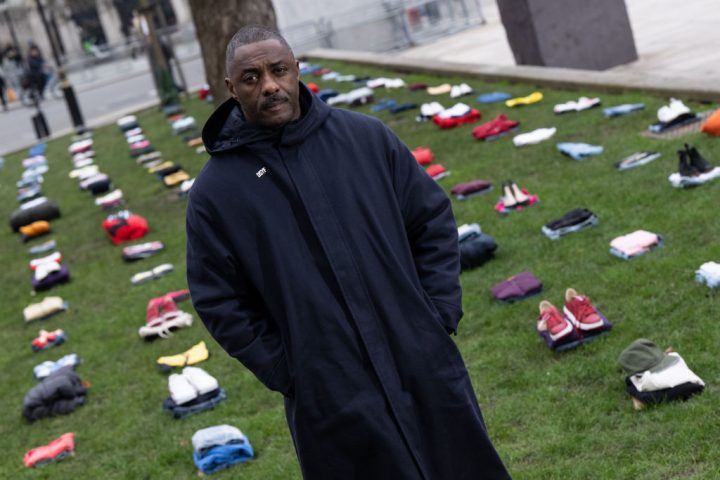Actor Idris Elba took to the airwaves on the Today programme this morning to call for more to be done to tackle the scourge of knife crime in Britain. Elba asked the government to speed up the ban on the sale of machete and ‘zombie’ knives to prevent more young people dying in knife attacks. Few will disagree with Elba’s practical solution for tackling this issue. It is, at least, more likely to succeed than some of the more fashionable solutions – particularly so-called ‘public health’ approaches – which are occasionally suggested as a solution to knife crime.
The rhetoric of a ‘public health’ solution to violence is very popular amongst people who dislike the idea of putting criminals in jail, or stopping and searching suspects. They think, perhaps in some vague social democratic way, that social workers can sort out the majority of criminal behaviour, if only the government would spend enough money. It’s invariably presented as a panacea, and a rational alternative to the ‘hang em’ and flog em’ approach of the right.
Successful so-called ‘public health’ and ‘community’ approaches to violence are anything but non-punitive
The holy grail of public health policing is Scotland’s legendary Violence Reduction Unit (VRU), which grew out of an ambitious project to tackle gang violence in Glasgow. It paid extraordinary dividends, achieving a 48 per cent decrease in non-sexual violent crime, a 38 per cent fall in homicide and a 43 per cent fall in attempted murder and serious assault since 2006/7. A 2020 Guardian editorial praised the approach, and used it as evidence that better alternatives to stop and search existed to deal with knife crime. The mythology of the non-punitive violence reduction programme is so powerful that even papers in reputable academic journals repeat in hushed tones the idea that ‘the Scottish VRU promoted principles of prevention and education over policing and justice’.
There’s a small problem with this narrative though: it’s not true. Successful so-called ‘public health’ and ‘community’ approaches to violence are anything but non-punitive. The average sentence for carrying a knife in Scotland was tripled over the course of the scheme. Stop and search was used far more extensively by the Scottish police at the time, and by 2010 rates were four times higher than in England.
In one of their most effective forms of intervention, the VRU invited gang members to voluntarily attend the sheriff’s court, where they found their gangs mapped, named, photographed and displayed in the courtroom. Gang members were informed in no uncertain terms that the police knew who and where they were, what they were up to, and the imminent certainty of arrest and imprisonment. They were then told about the impact of their violence on victims. Life-changing injuries were described. A mother talked about losing her son.
Only after this seriously big stick was waved did the carrot finally appear. Gang members were told there was a way out: ‘There was help with housing, relocation, employment and training. They were given a number to call if they wanted to take the offer up. Huge numbers of them did so, were put into the programme, and are no longer in the gang lifestyle.’
This is community policing with some serious teeth – steering offenders away from violence can work, but it takes the real threat of prison, confronting the effects of their actions, and effective policing to get people to make better choices when offered an alternative to crime. Yet progressive campaigners seem determined to learn only half of the lesson, and de-fang a transformative approach to the point of uselessness.
Dig deeper into the Glasgow experience and you discover a very different sort of policing and community organising than the medicalised, technocratic vision often wrongly presented by English campaigners. In the second year report on the VRU’s Community Initiative to Reduce Violence (CIRV), enforcement is step one in the process. The approach gives a central role to ‘the moral voice of the community’, and a collective message that ‘violence will no longer be tolerated’. In almost religious language, it speaks of offering ‘a positive message of hope’.
What was also impressive, in contrast to the arrogance, inflexibility and media management typical of London’s Metropolitan Police, was the humility, patience and willingness of Glasgow’s then leaders to experiment. Detective chief superintendent John Carnochan compared the process of establishing interservice cooperation as being similar to overcoming gang territorialism itself. Far from taking morality out of the picture, the VRU involved collectively taking responsibility for the problems of violence, with police holding themselves accountable along with communities.
England, and London especially, have their own unique challenges. The shadows of racial tension and suspicion undermine trust in the police. They also create a racialised politics around measures such as stop and search that don’t exist in Scotland to the same degree, where gang members are predominantly white.
But there was something striking about Elba’s intervention: that while some liberals get wobbly over the question of police powers, it took a campaigning luvvy like Elba to acknowledge the need for stop and search as a necessary but not sufficient tool in the fight. Elba was also able to respond effectively to the ethnic tensions around knife violence, casting it (correctly) as an issue that affects the whole country, regardless of skin colour. He, at least, seems to get that the Glasgow approach won’t work without swift and effective policing and justice.
Elba and his fellow campaigners have to overcome many stumbling blocks in their path if they want to see progress: from a dysfunctional Met to a flailing government to a prim liberal establishment that wishes the problem would go away. Still, it would be a pleasing irony if the star of TV’s Luther was able to make a difference to crime in the real world too.






Comments